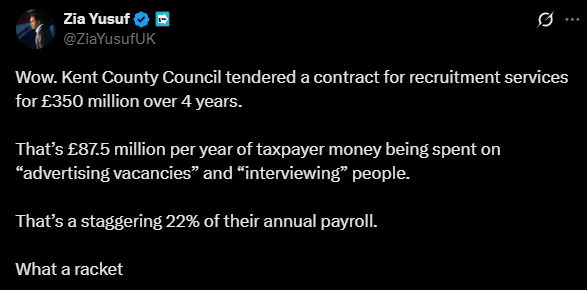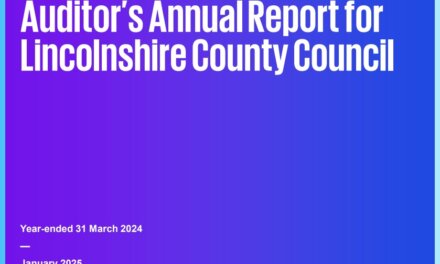In recent days, Reform UK spokesperson Zia Yusuf has stirred social media outrage with claims that Kent County Council is wasting £350 million on recruitment. At first glance, it appears to be a staggering and frankly irresponsible sum scandal in the making. But as is often the case with viral outrage, the truth is far more mundane, and the claims wildly misleading.
Here’s what’s going on.
What Is This £350 Million Contract?
This isn’t a local spending spree. It’s a national public sector recruitment framework hosted by Kent County Council.
In simple terms, it’s a shared service—a central, pre-approved menu of recruitment suppliers that any public body in the UK can use over the next four years. Councils, NHS trusts, schools, civil service agencies, and housing associations can all draw on it to hire staff more efficiently.
So, while Kent is listed as the “buyer”, they’re more like the host of the buffet. They’re not eating all the food themselves.
What Does the Framework Cover?
This isn’t about “posting job ads” for town hall clerks. The framework is designed for complex, wide-ranging hiring needs, including:
- Permanent, interim and executive recruitment
- Vetting and compliance checks
- Onboarding, payroll and HR services
- Roles across health, education, IT, legal, social care, construction, and more
In short, it’s a full-spectrum workforce toolkit for the public sector.
Why Is the £350 Million Figure So Misleading?
Because it’s a maximum framework value, not an actual spend.
The figure represents the combined ceiling across all participating organisations, which number in the hundreds over four years. And not a penny of it is spent until an organisation decides to use the framework and contracts a service.
Think of it like a credit limit on a shared account: it authorises spending if needed, but it’s not a bill. No one’s writing a £350 million cheque here.
“22% of Kent’s Payroll”? Completely False.
Reform’s claim that this framework equals 22% of Kent County Council’s payroll is not just exaggerated; it’s categorically wrong. That figure only makes sense if Kent alone were spending the entire £350 million, which they’re not. They’re simply administering the framework on behalf of others.
Why This Saves the Public Money
Running tenders every time you need a temporary children’s services director or emergency procurement support is slow, costly, and inefficient.
Frameworks cut red tape, lower costs through competition, and guarantee standards by vetting suppliers in advance. It’s best practice in both local government and Whitehall.
Many frameworks (like this one) are compliant with UK procurement law and even endorsed by central government bodies.
The Bigger Issue: Procurement ≠ Spending
One of the fundamental misunderstandings at the heart of Reform UK’s claim is the confusion between procurement authority and expenditure.
Approving a framework does not mean the money is spent. It means organisations are allowed to spend up to a defined limit under specific conditions. It’s permission, not payment.
Why This Matters
It’s alarming, but not surprising that Reform UK is willing to whip up public outrage based on such a fundamental misunderstanding of government operations.
At best, it’s a display of incompetence. At worst, it’s a deliberate attempt to sow distrust in how councils and public bodies work together to deliver services effectively.
The Bottom Line
Kent’s £350 million recruitment framework is:
- National, not local
- Optional, not mandatory
- A tool, not a bill
- An enabler of efficiency, not an abuse of power
Suppose Reform UK wants to be taken seriously as a party of government. In that case, let’s start by understanding how public procurement works.






Recent Comments